El Camino - The Way
Engage immigrant justice. Find transformative sermons.
Sign up below to receive recommended sermons, tips for preaching about immigration, and tools for churches seeking justice with immigrant communities.
We invite you to browse our collection of sermons from faith leaders who are shaping the way we think about immigration, accompany our communities, and advocate for just immigration policies.
Worship Service in Solidarity with Unaccompanied Minors Crossing the Borders
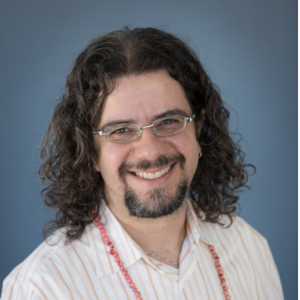
"Brothers and Sisters, today we are called to respond to God’s love by responding to the hurts and pains of ninos/children of all ages who are crossing the borders between Mexico and the Unites States by the hands of coyotes or even alone... From October through July, the authorities detained 21,842 unaccompanied minors, most at the Southwest border, a 48 percent increase over a year earlier... Today, we are called to worship God by pointing our hearts to God’s children crossing the borders and going through an uttered difficult time."
Thinking About the Issue of Immigration Biblically
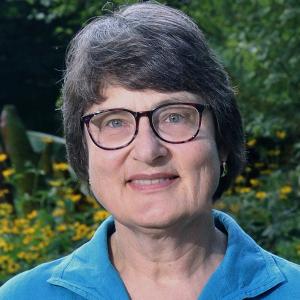
“What if, instead of viewing immigrants as burdens and drains on our society and its resources, we would choose to see them as gifts to us? What if God means to use immigrants to enrich our lives? Or refine our faith? What if God means to bless us through Christian immigrants by teaching us more fully who He is through them? Can we also enrich and bless the lives of immigrants in our midst?”
Let it Shine!
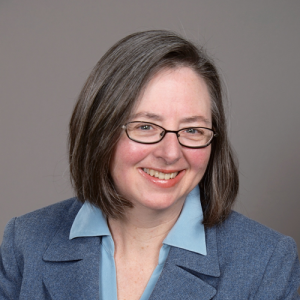
“Jesus says, ‘Let your light shine before others, in all the good that you do – in your sharing, in your caring, in your welcoming the stranger in my name. Let your light shine in your work for justice and freedom. Let your light shine as you share good news of the gospel.’ Let it shine! Let it shine! Let it shine! Amen.”
God’s Heart for Immigration

“Compassion for the poor and marginalized is more important than efficiency, and is more important than profit ... The Bible affirms that in a Godly society, the people in the margins should be cared for.”
Sermon preached at Saint Mo's Church.
Beyond Hospitality
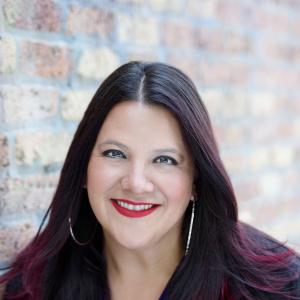
“The story of scripture is about a displaced people ... who better, brothers and sisters, to theologically reorient our colonized understanding of the scriptures than those who know that experience ... Do not advocate for my community ... because you want to save me. Advocate for us because you see it as a way of mutuality, you see me as human, you see them as human, who’s contributing something uniquely and distinctly to help you understand God better. Let us tell our stories.”
The Mother of Persistent Faith
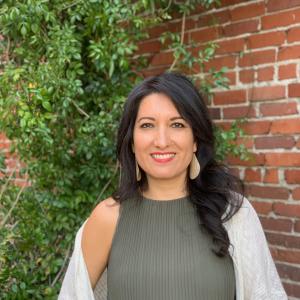
“Are we moving from a mentality of bread crumb mercy to bold and abundant mercy for all? Is the power of this Kingdom merciful enough to mend the family of God? Have we forgotten that we are familia? If the fear of the Lord is the beginning of wisdom, the fear of the other is the end of mercy. And faith without mercy is dead.”
What makes a Good Nation?
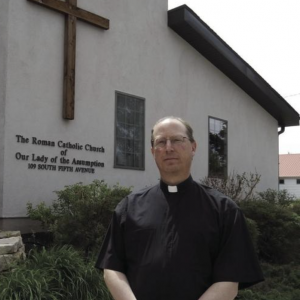
“People forced to flee war or persecution and needing asylum should be given protection by whichever country they are in, irrespective of race, religion, ethnicity, or place or country of origin. A ‘poop-hole’ nation is one where people are afraid that there isn’t enough for me and you, so I’m getting mine because who cares about you. A great nation is filled with people who know that God always provides more blessings to people who are generous, and courageous, and hopeful. A Christian nation is filled with people and policies which are patient, kind, loving, joyful, peaceful, faithful, gentle, and obedient to Jesus and his immaculate mother.”
Unvisited
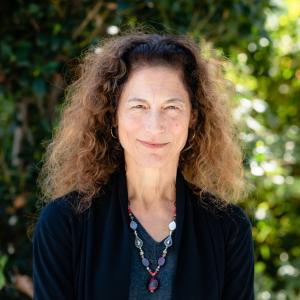
“In Matthew 25, Jesus tells the world that wherever one of the little ones is rejected – whether the hungry is left unfed or the prisoner unvisited or the stranger unwelcomed — he takes it personally. Whenever we ignore or turn away those in need, we hurt Jesus. And in the end, that hurts us all. We often pass by the hungry, forget the prisoner, and reject the stranger — hurting ourselves and others in the process.”
No Longer Foreigners

“This Jesus was a dark-skinned, Middle Eastern, low-skilled carpentry worker, persecuted ethnic minority, a refugee with no money to his name — categories that would not get him into this nation today"
I Desire Mercy

“God desires mercy, and mercy requires action. Mercy requires that we see the humanity of others, and also recognize our own humanity. Mercy sees the true need and seeks restoration. And in order to give mercy, it must flow of our own awareness of how we have received mercy so abundantly.”
Note: The audio quality for this sermon is poor. Please turn up the volume in the device that you use to listen to the sermon to be able to hear the sermon.
Dangerous Memory
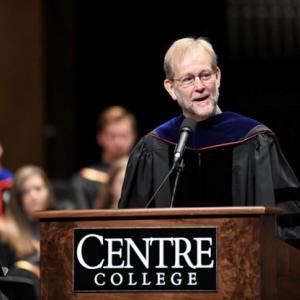
“It’s the story of the Exodus, but it’s also the story of 21st-century Syria. It’s no surprise that the Oct. 19, 2015, cover of TIME simply labeled the Syria crisis “Exodus.”
Sermon preached at Centre College.
Additional texts: Qur`an Sura 20; Babylonian Talmud, Megillah 10b
Breaking Through
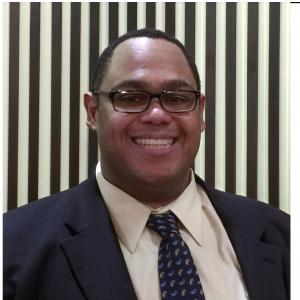
“This moral crisis is bigger than one instance, one executive order. We have to take this to the macro level. We have to see the pattern, and we have to see how it fits into the whole story. And that means we have to acknowledge the value system that created this. We have to acknowledge that segregation inspired South African apartheid. The same value system that ripped children from their homes in Africa, and that ripped children from home in the plantations, and that ripped children from their families on Indian reservations, and ripped children from their homes and put them in foster care systems, is the same system that is ripping children away from their homes by ICE.”
Preached at the Cathedral of the Beloved.
But They Feared God
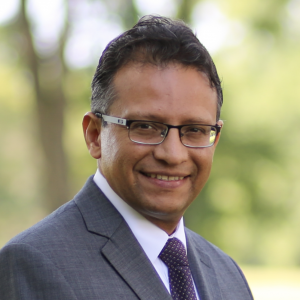
“We are constantly witnessing or facing difficult or oppressive situations in which we feel that we must be obedient or compliant, even though we know that these situations don’t align with God’s priorities and God’s will. This story, the story of the shrewd and faithful midwives, reminds us that our guiding principle to respond must always be God and God’s priorities. Our response can take different forms, and perhaps, in some cases, when there are risks for us, our response may require some shrewdness, and always, always must reflect our fear of God – this is our faithful alliance with God.”
Roll Down, Justice
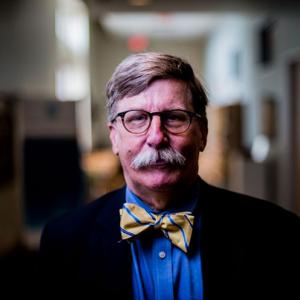
“We as a community of faith, as Christians, when we pay attention ... when we actually confront oppressive systems, then we are the light in the world that God intended us to be. And [when] we’re actively involved in the liberation of people, then that is indeed God’s light shining onto the world.”
Sanctuary and Solidarity on the Banks of the Nile
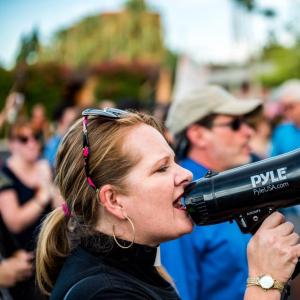
“Communities of color have survived violence, and repression, and persecution for generations, not because of some princess swooping in to save the day, but because they have been protecting, sheltering, and defending one another. Communities of color and undocumented communities have created sanctuary spaces over and over again as part of a strategy of survival. And white, documented people have just recently stumbled into this work and unfortunately, not only have we often acted as if we invented it, but we’ve cast ourselves in the starring role ... instead of following the leadership of those already doing the work.”
Economía de Gracia / Economy of Grace
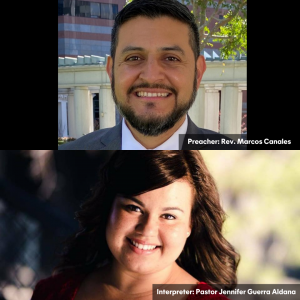
“Because in the economy of God’s grace, what appears to be leftovers, are the essence of God’s kingdom ... We will always have enough leftover, and we will always have enough to extend to others.”
“Porque en la economía de la gracia de Dios, lo que parece ser sobras, es la esencia del Reino de Dios ... Siempre va a sobrar y va haber para otros.”
Preacher: Rev. Marcos Canales, Interpreter: Pastor Jennifer Guerra Aldana
Courage / Valor Coraje
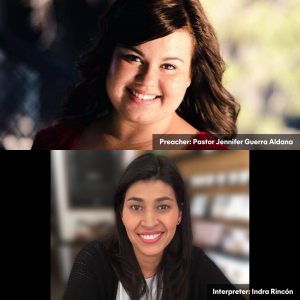
“Ruth reminds us that the boldness of immigrants are faithful examples of courage ... What we are reminded of is that God’s redemption is all inclusive. And it restores everything God created.”
“Pero Ruth nos recuerda en este pasaje que la valentía de los inmigrantes, son ejemplos de fe y coraje...Lo que nos recuerda es que la redención de Dios es inclusiva. Y restaura todo lo que Dios a creado.”
Preacher: Pastor Jennifer Guerra Aldana, Interpreter: Indra Rincón
Strike the Rock
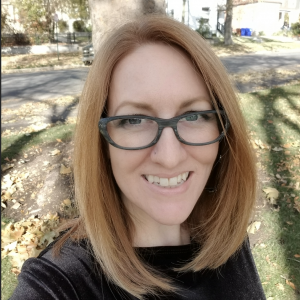
“We acknowledge that just because something is legal, does not mean it is moral … we affirm that we answer to a higher law. We affirm our own humanity and the humanity of others as the highest law to which one person can answer ... We can say never again, never again. Never again will we stand by while human beings are put into cages. Never again will we [remain] silent while children are torn from their parents. Never again will we pretend that we don’t know that people are dying out here in these deserts trying to make their way home.”
A Holy Meeting Place
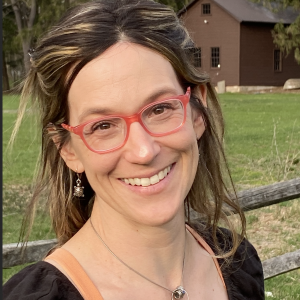
“What divides and differentiates— walls, boundaries, borders —also, somehow, are the very things that make love and connection possible. To adorn a wall with hearts, is to place a symbol of love, with care and deliberation, upon a symbol of separation and division. It’s to bless the place between — the meeting place, the liminal space — and to call it holy.”
Misquoted: Persistent Poverty

“It’s because ‘the poor will always be with you’ that we have all sorts of opportunities to practice hospitality, to practice loving strangers, to extend the sort of extravagant love that we would want to show to Jesus himself, or to a visiting angel. And don’t be surprised that someday you learn that’s exactly what you have done.”
Sermon preached at Flood Church.
On a Theology of Migration
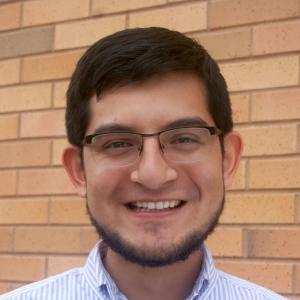
“God’s original intention for migration was to be a blessing, for it would result in the spreading of His glory across all the earth … True freedom does not only mean the freedom of movement, but also the freedom to stay.”
Daniel Montañez delivered this sermon in the Kaiser Chapel at the South Hamilton campus of Gordon-Conwell Theological Seminary.
Extraordinary Courage, Extraordinary Kindness
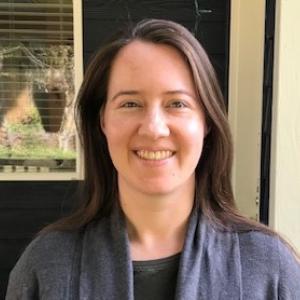
“Boaz goes out of his way, above and beyond what might have been normal or expected, to use his relative wealth, and security, and power to affirm Ruth’s dignity and value. He did this in the midst of a world that, not unlike ours today, did not always value people who were poor, or immigrants, or of a minority race, or ethnicity, or women.”
Going to Samaria
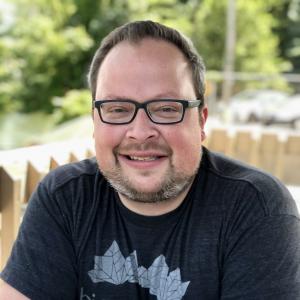
“We are citizens of the kingdom before we are citizens of the United States. And so, the question that I am always asked by Americans is, ‘Well, Zach, tell me, is it legal or not?’ The kingdom question: is it just or not? We have a long history as Wesleyans and Methodists of great leaders who didn’t ask, ‘is it legal or not’ when it came to slavery or women’s rights, or workers' rights. We said, ‘Is it just or not?’ And we will always choose to push for justice.”
Sermon preached at the Kingdom Conference at Asbury Theological Seminary.
Welcome Christ, the Refugee
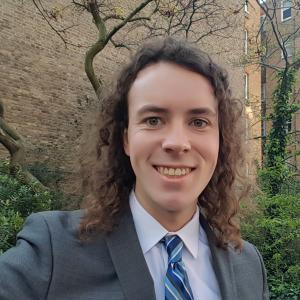
“Engaging in this work can allow us to sow those seeds of blessing that Bach put to music, and it can help us begin to even dimly resemble that foretaste of true bliss that is present in every refugee’s story of finding a home again — including the one of Mary, Joseph, and the Christ child that we celebrate every year in the Christmas story. And it’s that true bliss that comes from a bit of heaven showing up right here on earth. When we welcome the refugee amongst us, so too do we welcome Christ to come down from heaven and dwell with us again.”
Bound to Our Siblings
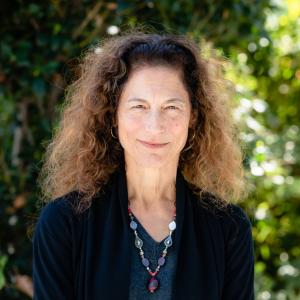
“We are citizens of an earthly realm, which deserves our loyalty and respect. However, we are also always bound to all of our brothers and sisters in the family of our one heavenly parent. And when there is a conflict between the demands of our faith and the demands of our nation, we must place God first. The blessing of living in a democracy is that we can actually have a voice in the laws that our nation establishes ... We can steward the talent of our voices, votes, and influence for the shalom of our communities and society.”
Border Sermon
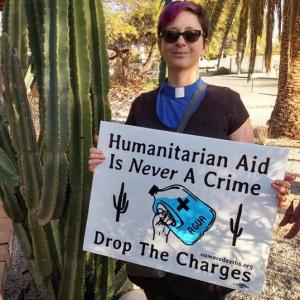
“Not only are [the] migrants crossing the border being criminalized in ever more punitive ways, so are the people who are trying to help them. Just over a year ago, in January of 2018, nine volunteers with No More Deaths were charged with federal misdemeanors for abandonment of property — basically for littering in the Cabeza Prieta National Wildlife Refuge. And in January 2019, Natalie Hoffman, Oona Holcomb, Madeline Huse, and Zaachila Orozco McCormick were put on trial and convicted just a few days before my visit. In March, they were sentenced to 15 months of probation and fines.”
The Undocumented Crippled Woman
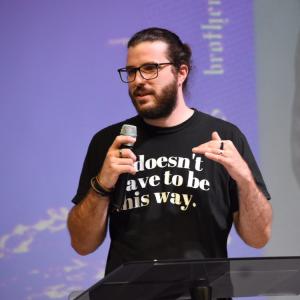
“This is the Lord we serve, one who reminds us that God’s hospitality defies our narrow biblical interpretations and legal applications. We serve a God who confronts the powerful, telling them that their laws ignore God’s justice, that their words ignore God’s creation ... because everyone is created in the image of God. So, may we all work together to extend the same compassion, mercy, and justice that Jesus extended as we welcome immigrants and those [who] society pushes aside into our communities. Because it is in these seemingly small acts that God’s kin-dom makes itself visible in the present.”
Choosing Healing
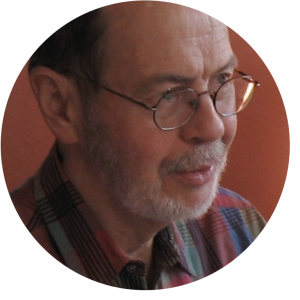
“Like those 70, the immigrants may come to us and say, ‘Peace be to this house.’ Seemingly with no resources – no purse, no bag, no sandals – they come to us, greeting no one on the road because they know no one here. As it was with Naaman and the Hebrew girl, so it may be with us as we pay attention to what is offered to us by ‘the least of these’, the little sisters and brothers of Christ. They may call our attention – individually and as a society – to the healing, the wholeness, the salvation that God desires for all people.”
Go and Do Likewise
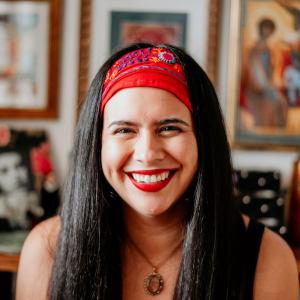
“We all have a part we can play if we are willing to come near, and see, and offer radical empathy in the form of our action ... ‘We aren’t obligated to finish the work, but we are obligated to be a part of it.’ So, like the Good Samaritan, we draw near. We challenge ourselves not to look away, but to see this is the hardest part — the willingness to immerse ourselves in the pain of the world and hold it close, to really see with open eyes, and then carry what we discover with us alongside our everyday pains and burdens.”
Martha's Confession
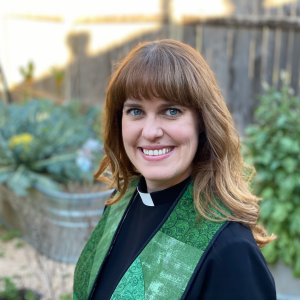
“On Friday, Pastor Matt and I walked to the international bridge between Brownsville and Matamoros, Mexico. We walked with almost 100 faith leaders from the United States into Mexico and saw tents lined up at the border ... I came and visited Martha and Mary where these grieving women couldn’t cry anymore, their hope was dying. I couldn’t get ahold of Jesus. He was in another town and couldn’t explain why he wasn’t right there.”
Philoxenia vs. Xenophobia
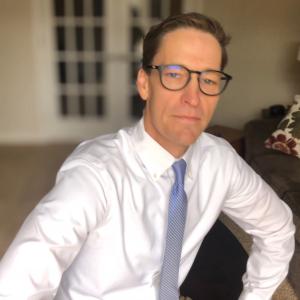
“There are dozens and dozens of scriptures in our Bible that talk about the love of the stranger and how we are to treat people, even people who are different from us. It’s at the beginning of the Bible, it’s at the end of the Bible, and it runs throughout the Bible ... We know that these compassionate scriptures are rooted in the experience of God’s people because God’s people were often the foreigners and the outsiders themselves.”
Sibling Keepers
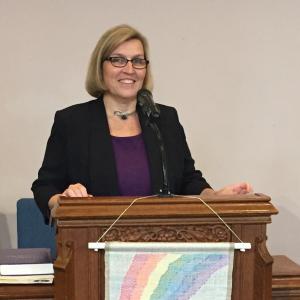
“I am reading these stories through the lens of migration. Joseph’s parents, and grandparents, and great-grandparents had all been wanderers at various times in their lives. But in Joseph’s story, there are so many elements common to future human migration patterns. One that jumps out right here, is the idea that being cruel is not enough, evil also makes a profit. This echoes for me in the humanitarian crisis that is our immigration system. Our system currently criminalizes asylum seekers who cross the border. Desperate people fleeing violence, persecution and poverty are being detained by the thousands in private for-profit prisons.”
We Have Arrived
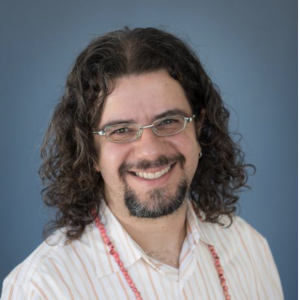
“Nonetheless, here we are! Thank God here we are! By the mercy of God here we are! Next to a tragic event that killed a precious family in cruel ways. Next to a wall that is searing with fears and constant threats. A wall of fear that begets anger, that begets destruction, that begets violence, that begets fear. Nonetheless, we came. Thank God we came! By the mercy of God, we came! We came to offer our presence. We came to show our love and support. We came to learn. We came to listen about love. We came to learn to speak about love.”
Border Crossings
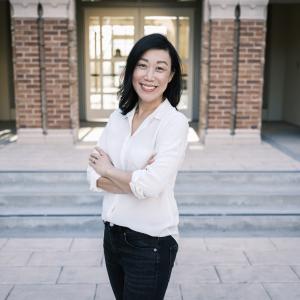
“God crossed borders to be Emmanuel, God with us, the border between heaven and earth, human and divine, Bethlehem and Egypt, by becoming a refugee in exile through His Son. He knows that state of displacement, of homelessness, of being in danger. And it's in Jesus, our savior who crossed borders, [where] we find refuge and rest. And it's because of Jesus who crossed borders, we become people in exile, who see ourselves in solidarity with those in need of refuge and rest. And it's in Jesus' name, we offer refuge and rest to those in need.”
Holy Refugees and Exiles
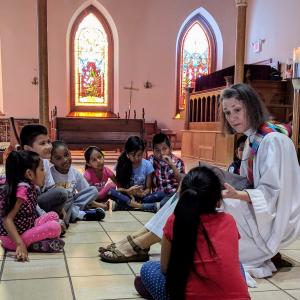
“Matthew pulls a refrain from Jewish scripture about God’s partiality to the oppressed. ‘Out of Egypt have I called my son.’ God sided with the slaves against Pharaoh. Now, God sides with refugees from terror and violence. This child will grow to adulthood. And at the end of Matthew’s Gospel, Jesus will tell us: ‘Not only the chosen people Israel, but every child seeking asylum, is God’s chosen. As you treat them, you treat God’s child.’”
Bearing Witness
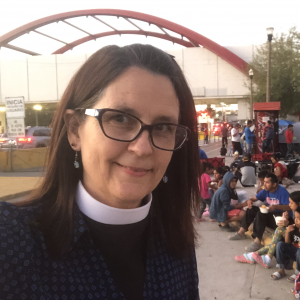
“The invitation is to move into a place where you can bear witness. You can bear witness because you understand, and have discerned, and have experienced, and have reflected, and have listened to the word and the will of God that weaves through your words and weaves, and weaves through your actions, and weaves through your public witness.”
Una Conversación con el Dr. Danny Carroll Rodas
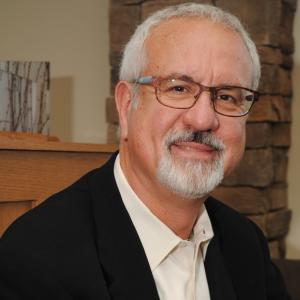
“Aun cuando vamos a Genesis 1, la palabra nos dice que el ser humano tiene que llenar la tierra. ¿Como va a hacer eso? Pues migrando. Entonces podemos, segun lo que yo creo, migrar es parte del ADN del ser humano. Porque la historia humana es la historia de migración.”
Confronting Legion
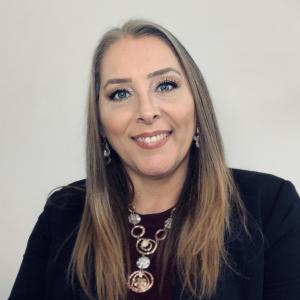
“Jesus saw the humanity in the one the community rejected and cast away. He didn’t run from his appearance or his condition. He stopped, had compassion, and gave him the attention he needed. He didn’t question if it was acceptable, if it was convenient or right, he just set him free ... Jesus overpowered the injustice to bring justice for this man, and then told him to tell everyone what happened. Jesus not only set him free, he made sure the community saw it [and] left him to live rightfully and with dignity in his community.”
The Mouth of a Shark
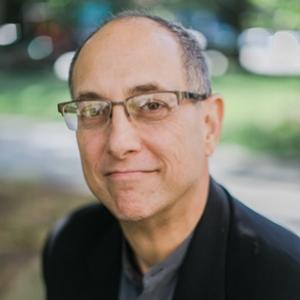
“The most common thread throughout the Hebrew and Christian scriptures is the great truth that everyone is equal in the eyes of God. Therefore, everyone deserves the same unconditional, radical, loving welcome and care and compassion.”
No Human Being is Illegal
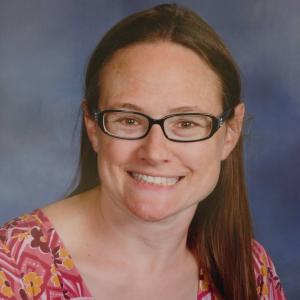
“When we collectively decide that some people are illegal and others are legal, we divide people in ways that God never intended us to be divided. Do countries need immigration policies? Of course. But if those policies aren't looking out for the well-being of the people God so dearly loves, if those policies are based in oppression and harm, then they don’t fit with our values as Christians, as followers of Jesus.”
Immigration, ICE, and Jesus
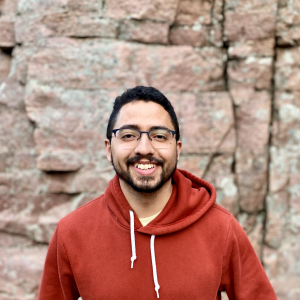
“God is inviting us into collective memory. We are reminded that there are no self-made people; only hand-made people made by the hands of God. They are all worthy of love. They are all worthy of welcome. God is on the side of the stranger.”
Forgiveness Without Borders
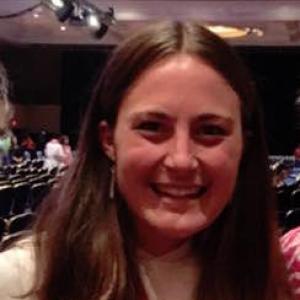
“The story of the gospel is a story of an unprecedented experiment in mass forgiveness. And if that’s what saves us, then that is what we preach, and live, and practice — in our personal lives and out in the public square. We practice it by canceling debts that are owed to us, and by advocating for the cancelation of debts that oppress our brothers and sisters in poverty. We practice it by releasing grudges that we hold against church members, and friends, and family, and by dismantling bias and systemic racism, acknowledging and addressing how it lives in each one of us.”
Shining Your Light on Every Injustice, Near or Far
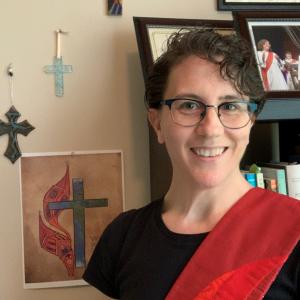
“God used [the light that came from the flash bangs and from the fires] to shine a light on the injustices, so that God’s people near and far could no longer deny it, could no longer pretend that it wasn’t there. So that we could all find God’s image in the face of our neighbors, even and especially in our Black and brown neighbors, the ones who have been crying out for justice for so long.”
Choose This Day
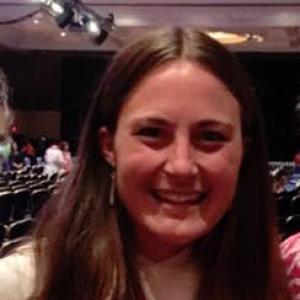
“Choose this day what kind of people we’ll be, Joshua says. What kind of church will we be? What kind of nation will we advocate for? Joshua encourages us to choose life. Choose to be people of justice, instead of people of exploitation. Choose to be people who value collective belonging, instead of self-sufficiency. Choose to be people who extend grace; who walk humbly; who protect the vulnerable.”
Romans 13
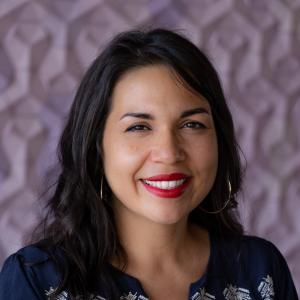
“As much as possible, we are called to live peaceably in the places we are in for the sake of our most vulnerable neighbors, and for the sake of the gospel. We are called to live in peace with our neighbors, but more than that, we are called to seek the peace of our neighbors, of our community ... It is our calling to seek true peace, real peace, not some watered-down version of peace [but] peace, shalom, for our neighbors, with our neighbors, in our neighborhoods— peace where nothing needs to be added and nothing needs to be taken away.”
Sermon preached at New Community Church.
Sermon starts at minute 16:07 of the Facebook video.
Kollao-ing with Immigrants Along Life's Journey
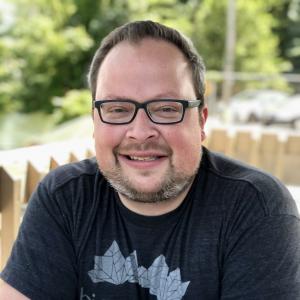
“Literally, the Holy Spirit looks at Philip sharing space, being on the same road, and the Holy Spirit says, ‘That is not enough. You need to go stick like glue. You need to go join yourself to. You need to go share life. Get more proximate to this Ethiopian eunuch.’ ... This has radically changed my view of this story because I realize that it’s not enough, from God’s perspective, just to be just kind of close– to be in the same space, to go to the same schools, or be in the same neighborhoods. No, the Holy Spirit says you need to kalao, you need to share life. Can I just share? We are not good. Even as the church, we are not good at kalao. We need to be reminded by God to kallao more. Studies have shared that only 1 out of 10 immigrants has ever been invited into the home of a native-born U.S. citizen.”
Sermon preached at City Life Church.
Immigration and Christian Faith: A Biblical Approach
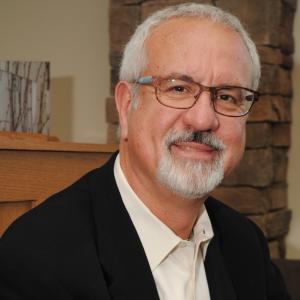
“The world as they knew it, no longer existed ... The immigration process into this country is the constant negotiation of loss.”
Sermon was preached as the chapel message for the annual theology lecture at William Jessup University.
Jesus as Refugee and Stranger
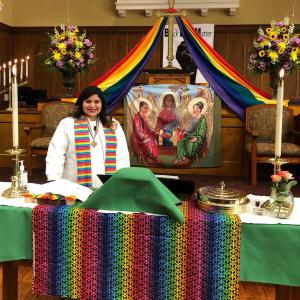
“After Jesus’ birth, there was an active persecution against him even though he was yet a toddler. Joseph and Mary had to decide to leave a place they called home. Packed whatever they could and take off on a long journey to another town. They left family, friends, possessions, all to save the life of their child. Similarly, as we hear the stories of our immigrant siblings, as we see and hear how they travel long distances to get to the United States, we encounter the story of Jesus as a refugee.”
Sermon starts at minute 35:17 of the video recording.
The Mother Who Sees: Hagar Mother of Our Faith

“She left Egypt as an enslaved woman, but she returned a free woman. A free woman who was transformed by God’s unveiling love ... How can we be reconciled with one another in a world where we are divided by walls, checkpoints, and by the threat of violence against those who are most vulnerable?”
Sermon preached at Metro Hope Church.
What We Expect & What We Find
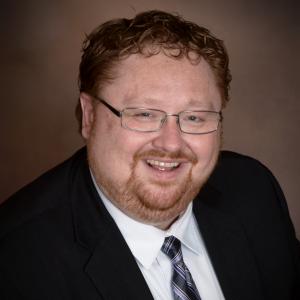
“When we witness unjust and racist policies based on the question, ‘Can anything good come from these people?’ we must be prepared to respond like Jesus: ‘Come and see.’ Immigration policies that punish people for the color of their skin must be dismantled. And last time I checked, dismantle is an action verb.”
Keepers of the Law
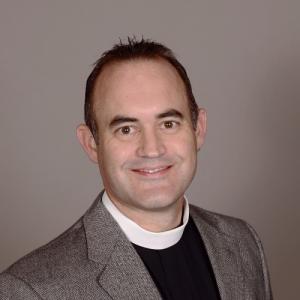
“Jesus gives us some help today. In these stories … and really throughout Jesus’ ministry, Jesus makes one principle very clear that can help us as we struggle to find that balance between accountability and forgiveness, between keeping the law and making merciful exceptions. This was Jesus’ principle: Jesus always chose life. He always chose people’s needs, their health, and their well-being over the law.”
THIS IS US!
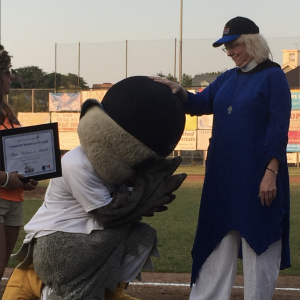
“I don’t recall Jesus ever asking if someone had the right documents in order to receive compassion. The gospel never said that those 5,000 needed to show paperwork before getting fed. Jesus didn’t turn away lepers or demon-invested folks because they lost their wallets. And I guarantee you, Jesus does not check IDs before raising us to new life.”
Migration as Grace: A Conversation with Robert Chao Romero
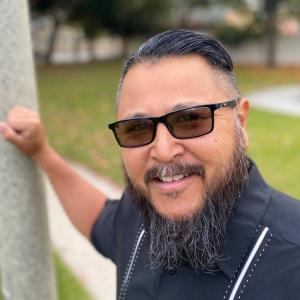
“Migration is a source of God's unmerited favor and loving kindness to both immigrants and their host countries ... Migration as grace is a very clear biblical principle that we must unite around ... Hope happens when we come together as the Body of Christ.”